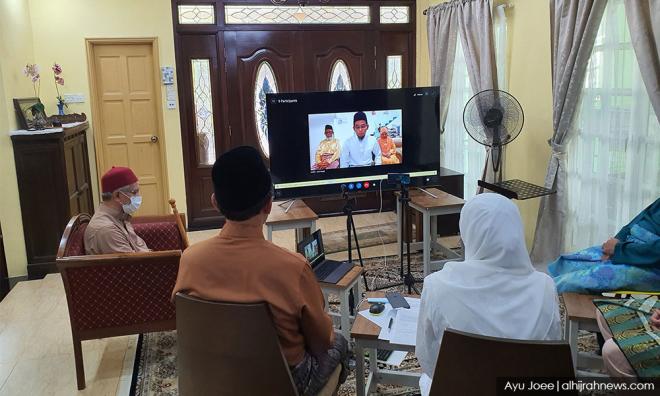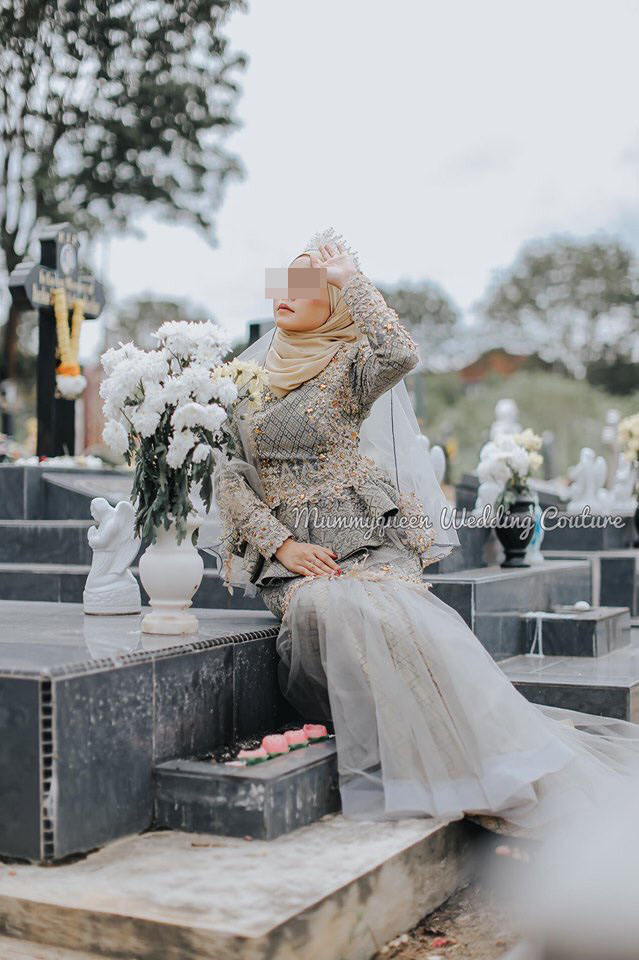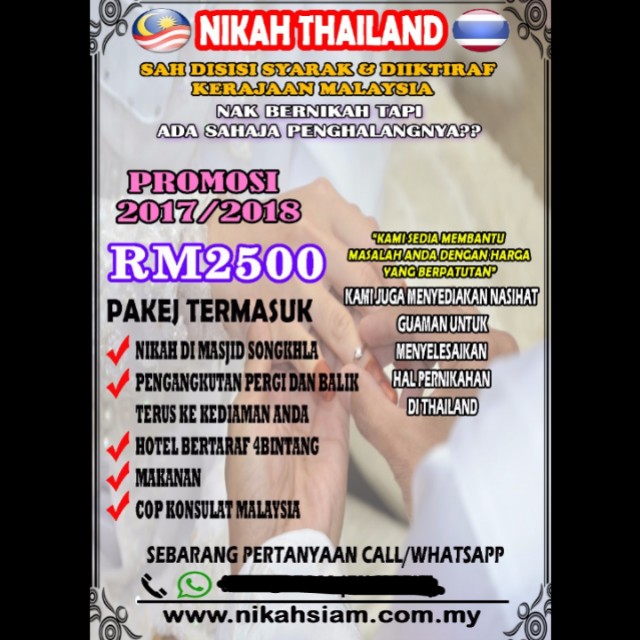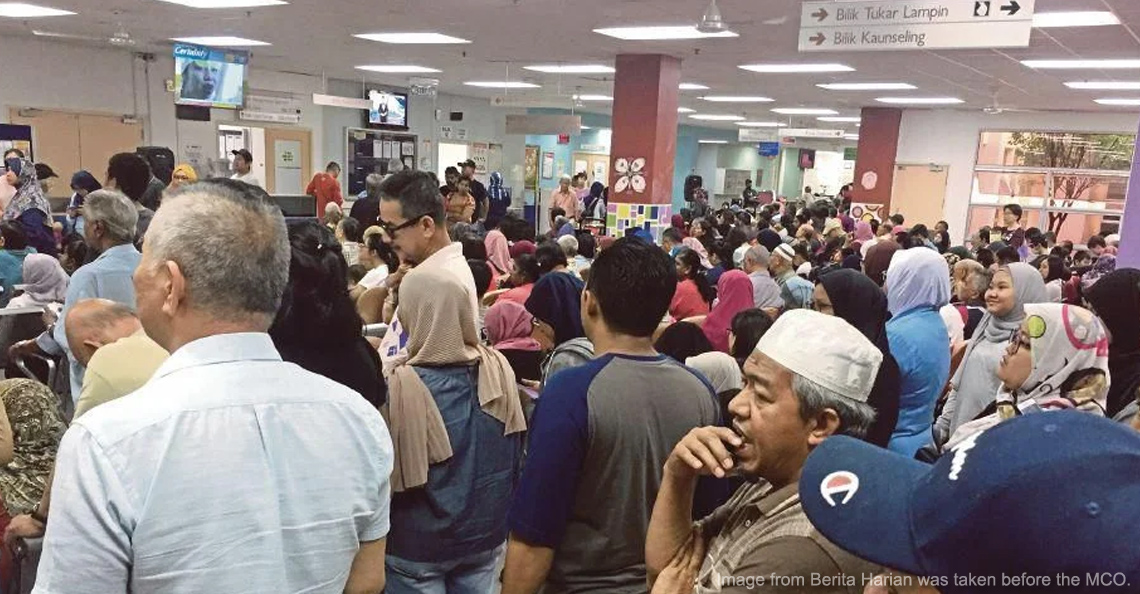Here’s how Muslim marriages in Malaysia are adapting to the MCO.

- 593Shares
- Facebook564
- Twitter7
- LinkedIn6
- Email6
- WhatsApp10
[Artikel ini asalnya disiarkan di SOSCILI. Untuk baca artikel ni dalam BM, klik sini!]
Recently, the government had relaxed the Movement Control Order (MCO) by making it a conditional MCO. And while many people can now go back to work or eat in restaurants, there are some things that we’re still not supposed to do in this ‘new normal’. An obvious one would be holding social gatherings, like wedding receptions.
Just the marriage solemnisation by itself is still possible though, so you might have seen or heard of some unconventional Malay weddings recently, where people married online through video conferencing, or where the ceremony was held just outside a house gate.

Since Dr Noor Hisham Abdullah, the Health DG, had previously advised us to not congregate for between six to twelve months, there’s a chance that these new kinds of weddings will be practised for some time longer, even if the MCO is lifted soon.
Overall, these new ways of marrying people seem a lot simpler with less frills. But if you’re a Muslim couple having the itch to hitch in these diseased times, it won’t be as simple as getting on Zoom and saying your vows. There will still be some hoops to jump through, and as it turns out…
The hoops are different depending on which State Religious Authority (JAIN) you’re under

Technically, it can be said that each State Religious Authority (JAIN) has their own special MCO marriage procedures, but they don’t differ that much between one another. So we won’t be looking at every state’s procedures, but rather just Selangor and Pahang.
Before we get any further, these MCO marriage procedures are only valid if the only thing left on your marriage checklist is to solemnize your union, or akad nikah in Malay. That means that if you haven’t gone through a marriage course (which is a sort of class that teaches Muslim marriage details to future brides and grooms) or filled out the appropriate forms… wait until the pandemic blows over loh.
Anyways, before the ‘aku-terima-nikahnya‘s start flying all over the place, Muslim couples first need to obtain something called the marriage permission first, or kebenaran berkahwin in Malay. This can be obtained at District Religious Offices (PAID), and in an MCO-bound Selangor, here’s how you can get one:
Before going the the PAID
- Call the PAID between 9 am to 1 pm to ask about the process you’ll be going through at their office.
- Their officers will confirm that you have all the required forms and supporting documents in order.
- You will be given a PIN number, as well as a date and time to come to their office.
At the PAID office
- You will have to scan their office’s QR Code for contact tracing with your phone before being allowed into the building.
- The officer at the entrance will check a screenshot of the PIN number given to the applicant, and only those with PIN numbers will be allowed in.
- Now you can go to the counter to get your marriage permission, or renew an expired one.
- With a marriage permission, you can now inform PAID when your big day will be, and if necessary, be married through a video conference.
After the marriage is solemnized, you will receive a temporary marriage declaration slip, which can be later turned in to the nearest PAID office for a real Selangor Marriage Declaration Letter once the MCO is over. Selangor’s procedure is actually quite similar to the one used in the Federal Territories, so if you want to compare the two you can check with the Federal Territories Religious Office (JAWI).

For the other states, we can perhaps refer to the MCO procedure set by the Pahang Religious Department (JAIP). In Pahang, priority is given to couples who already have marriage permission from a PAID office. To get married after that,
- You have to download some forms and wedding procedures from e-Munakahat Pahang.
- Complete the forms and e-mail them to relevant religious offices, telling them about who will be present at the ceremony as well.
- A PAID office will e-mail a notification and verify your marriage ceremony.
- You will then receive the details on the ceremony through an e-mailed letter, which you will have to print out.
- Finally, you will have to be present at the PAID office you’re assigned to get married at, and bring the required documents.
Most of the time, the actual ceremony can only be done at a PAID office, or another place that the District Kadi (a Muslim marriage officiator) deems suitable. The place must comply with safety procedures, and the ceremony must be very brief – 20 minutes at most.
“A few pictures of the marriage ceremony will be taken by the District Religious Office for the purposes of preparing a report, for records as well as the possibility of recurring issues.” – translated from JAIP.

So as you can see, there is a difference in procedures between the states in Malaysia, with video conference marriages only enabled in the Federal Territories and Selangor, while other states allow a normal ceremony subject to special MCO procedures. They might allow video conference marriages if it’s absolutely necessary, though, like in Perlis.
All this might sound too complicated, so some might be tempted to take a shady shortcut by crossing the border and having a Thailand marriage. Unfortunately…
Because of Thailand’s version of the MCO, Malaysians can’t marry there for now

In case you’re not familiar with the practice, some couples would choose to get married across the border in Thailand, more often than not for not-so-wholesome reasons like eloping or secretly marrying more than one person (polygamy). As for why, getting hitched in Thailand could allow you to get around some of Malaysia’s marriage requirements. However, it seems like marriages are on hold in Thailand for now.
According to a report by Harian Metro, those whose job was ‘assisting’ people to get married in Thailand are now facing problems because they have to postpone all marriage business there, since Thailand had implemented something similar to Malaysia’s MCO.
“Before the MCO, I manage around four couples in a month by myself… I can say that I would enter (Songkhla, Thailand) almost every week to handle their marriages.” – Rudi, ‘marriage assistant’, translated from Harian Metro.
It should be noted, though, that this kind of cross-border marrying is actually an offence that can get you fined or imprisoned if found guilty, especially for polygamy cases without permission from a court. So don’t play play ah.
Anyways, if you want to know more about Muslim marriages during the MCO, you can always contact the nearest District Religious Office to ask. And why not now? It’ll make a good story one day, and you can save on reception.
- 593Shares
- Facebook564
- Twitter7
- LinkedIn6
- Email6
- WhatsApp10



